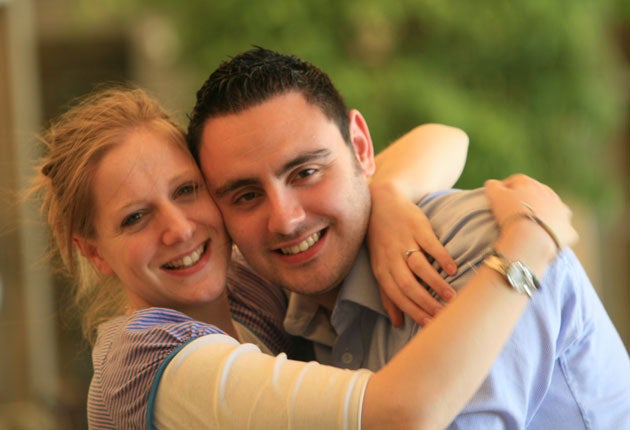Stop the Exodus: Anglicans issue rallying cry
Social change, distrust of institutions and growing individuality is leaving rows of empty church pews

Your support helps us to tell the story
From reproductive rights to climate change to Big Tech, The Independent is on the ground when the story is developing. Whether it's investigating the financials of Elon Musk's pro-Trump PAC or producing our latest documentary, 'The A Word', which shines a light on the American women fighting for reproductive rights, we know how important it is to parse out the facts from the messaging.
At such a critical moment in US history, we need reporters on the ground. Your donation allows us to keep sending journalists to speak to both sides of the story.
The Independent is trusted by Americans across the entire political spectrum. And unlike many other quality news outlets, we choose not to lock Americans out of our reporting and analysis with paywalls. We believe quality journalism should be available to everyone, paid for by those who can afford it.
Your support makes all the difference.An extra half a million people are expected to help fill the pews in churches across Britain today. Regular worshippers are being asked to help swell congregations by bringing friends or the lapsed faithful back into the fold as part of the Church of England's Back to Church initiative.
Although there are around 41 million self-described Christians in the UK – three quarters of the population – a mere 10 per cent of them actually attend services regularly, and that number is falling.
Most people find themselves in church only at Christmas, Easter, or for weddings, funerals and baptisms.
The Christian Research organisation, which gathers information on religious trends, said that in 1990 more than 5.6 million people in the UK – then 10 per cent of the population – were active church members. By 2000 this had fallen to 4.3 million; and by 2015, the organisation estimates it will be down to barely more than three million people.
Eileen Barker, emeritus professor of sociology at the London School of Economics and founder of the Information Network Focus on Religious Movements (Inform), said that the decline in congregations reflected "increasing social diversification".
"There are at least 1,000 different religious groups practising in the UK at the moment," she said. "Many are very small, with only a handful of members. There's a general distrust of institutions and more of a focus on individuality. There are pagans and even Jedi Knights who say they don't have to go to church to be religious."
She added that those who regularly attend church could now be as low as 6 per cent of the population.
In addition to Christians, there are 1.6 million Muslims in Britain. They make up around 3.3 per cent of the population, up from 1.8 per cent in 1996, however, a far higher proportion od Muslims are actually practising their faith compared to Christians. By 2050, if current trends continue, the number of Muslims in Britain could grow to around three million, still a small proportion of the population.
According to the 2001 census there are 558,000 Hindus in Britain, the next biggest religious group at 1.4 per cent and an increase from 0.6 per cent from 1996; and 267,000 Jews whose numbers have remained static. Around 8.5 million people say they no religion making up 15 per cent of the population.
Back to Church Sunday: Britons and their faiths
Jewish
Judith, 23, and Mark Frazer, 24, worship at the United Synagogue in Borehamwood and Elstree in Hertfordshire
"From an Orthodox perspective, going to a synagogue on a Saturday is part of a wider ritual," Mark said. "The entire week you work hard, but on the Sabbath you change all that – you don't use electricity, you don't write. It's not so much a day of 'rest' but a day of spirituality, and part of that is going to the synagogue to pray."
Catholic
Nikki, 28, and Alex Thomson, 27, attend St Agnes Catholic Church in Cricklewood, north London
"Even if I wasn't a practising Christian," said Alex, "it would be worth going to church. It gives you a sense of perspective and stops you worrying about everyday things."
Pentecostal
Ade, 48, and Ronke Adeagbo, 40, attend the New Covenant Cherubim and Seraphim Movement, Abbeywood, south London
"It's something I've been doing all my life and it's part of my DNA," said Ronke. "Faith reminds you that if you pray there will be a solution."
Church of England
Kerry, 39, and Peter Broadley, 37, attend Christ Church in Chilwell, Nottingham
"We have very busy lives," Peter said, "and it's nice to take two hours a week to get a bit of peace. There's also the positive message and the huge amount of good work the church does."
Baptist
Mair, 70, and Brian Granthier, 72, attend Hereford Baptist Church
"We are very involved in the church," said Mair. "It's central to our lives, and has been over the years, because if you are a follower of Jesus Christ it's something that changes everything in your life. It's also an opportunity to serve. I can't imagine it not being in my life."
Muslim
Seema Ahmad, 43, and Farooq Murad, 48, live in Leicester
"I grew up in a non-practising Muslim household," Seema said. "I became practising at university when I realised it was a wonderful faith, full of mercy, love and forgiveness, not necessarily what I thought before. I believe that my aim as a Muslim is to be aware of God's presence at all times."
Join our commenting forum
Join thought-provoking conversations, follow other Independent readers and see their replies
Comments